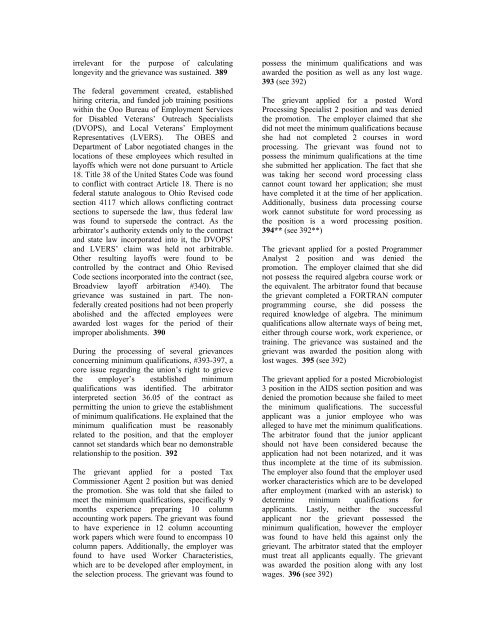by Contract Number (PDF) - OCSEA
by Contract Number (PDF) - OCSEA
by Contract Number (PDF) - OCSEA
Create successful ePaper yourself
Turn your PDF publications into a flip-book with our unique Google optimized e-Paper software.
irrelevant for the purpose of calculating<br />
longevity and the grievance was sustained. 389<br />
The federal government created, established<br />
hiring criteria, and funded job training positions<br />
within the Ooo Bureau of Employment Services<br />
for Disabled Veterans’ Outreach Specialists<br />
(DVOPS), and Local Veterans’ Employment<br />
Representatives (LVERS). The OBES and<br />
Department of Labor negotiated changes in the<br />
locations of these employees which resulted in<br />
layoffs which were not done pursuant to Article<br />
18. Title 38 of the United States Code was found<br />
to conflict with contract Article 18. There is no<br />
federal statute analogous to Ohio Revised code<br />
section 4117 which allows conflicting contract<br />
sections to supersede the law, thus federal law<br />
was found to supersede the contract. As the<br />
arbitrator’s authority extends only to the contract<br />
and state law incorporated into it, the DVOPS’<br />
and LVERS’ claim was held not arbitrable.<br />
Other resulting layoffs were found to be<br />
controlled <strong>by</strong> the contract and Ohio Revised<br />
Code sections incorporated into the contract (see,<br />
Broadview layoff arbitration #340). The<br />
grievance was sustained in part. The nonfederally<br />
created positions had not been properly<br />
abolished and the affected employees were<br />
awarded lost wages for the period of their<br />
improper abolishments. 390<br />
During the processing of several grievances<br />
concerning minimum qualifications, #393-397, a<br />
core issue regarding the union’s right to grieve<br />
the employer’s established minimum<br />
qualifications was identified. The arbitrator<br />
interpreted section 36.05 of the contract as<br />
permitting the union to grieve the establishment<br />
of minimum qualifications. He explained that the<br />
minimum qualification must be reasonably<br />
related to the position, and that the employer<br />
cannot set standards which bear no demonstrable<br />
relationship to the position. 392<br />
The grievant applied for a posted Tax<br />
Commissioner Agent 2 position but was denied<br />
the promotion. She was told that she failed to<br />
meet the minimum qualifications, specifically 9<br />
months experience preparing 10 column<br />
accounting work papers. The grievant was found<br />
to have experience in 12 column accounting<br />
work papers which were found to encompass 10<br />
column papers. Additionally, the employer was<br />
found to have used Worker Characteristics,<br />
which are to be developed after employment, in<br />
the selection process. The grievant was found to<br />
possess the minimum qualifications and was<br />
awarded the position as well as any lost wage.<br />
393 (see 392)<br />
The grievant applied for a posted Word<br />
Processing Specialist 2 position and was denied<br />
the promotion. The employer claimed that she<br />
did not meet the minimum qualifications because<br />
she had not completed 2 courses in word<br />
processing. The grievant was found not to<br />
possess the minimum qualifications at the time<br />
she submitted her application. The fact that she<br />
was taking her second word processing class<br />
cannot count toward her application; she must<br />
have completed it at the time of her application.<br />
Additionally, business data processing course<br />
work cannot substitute for word processing as<br />
the position is a word processing position.<br />
394** (see 392**)<br />
The grievant applied for a posted Programmer<br />
Analyst 2 position and was denied the<br />
promotion. The employer claimed that she did<br />
not possess the required algebra course work or<br />
the equivalent. The arbitrator found that because<br />
the grievant completed a FORTRAN computer<br />
programming course, she did possess the<br />
required knowledge of algebra. The minimum<br />
qualifications allow alternate ways of being met,<br />
either through course work, work experience, or<br />
training. The grievance was sustained and the<br />
grievant was awarded the position along with<br />
lost wages. 395 (see 392)<br />
The grievant applied for a posted Microbiologist<br />
3 position in the AIDS section position and was<br />
denied the promotion because she failed to meet<br />
the minimum qualifications. The successful<br />
applicant was a junior employee who was<br />
alleged to have met the minimum qualifications.<br />
The arbitrator found that the junior applicant<br />
should not have been considered because the<br />
application had not been notarized, and it was<br />
thus incomplete at the time of its submission.<br />
The employer also found that the employer used<br />
worker characteristics which are to be developed<br />
after employment (marked with an asterisk) to<br />
determine minimum qualifications for<br />
applicants. Lastly, neither the successful<br />
applicant nor the grievant possessed the<br />
minimum qualification, however the employer<br />
was found to have held this against only the<br />
grievant. The arbitrator stated that the employer<br />
must treat all applicants equally. The grievant<br />
was awarded the position along with any lost<br />
wages. 396 (see 392)
















